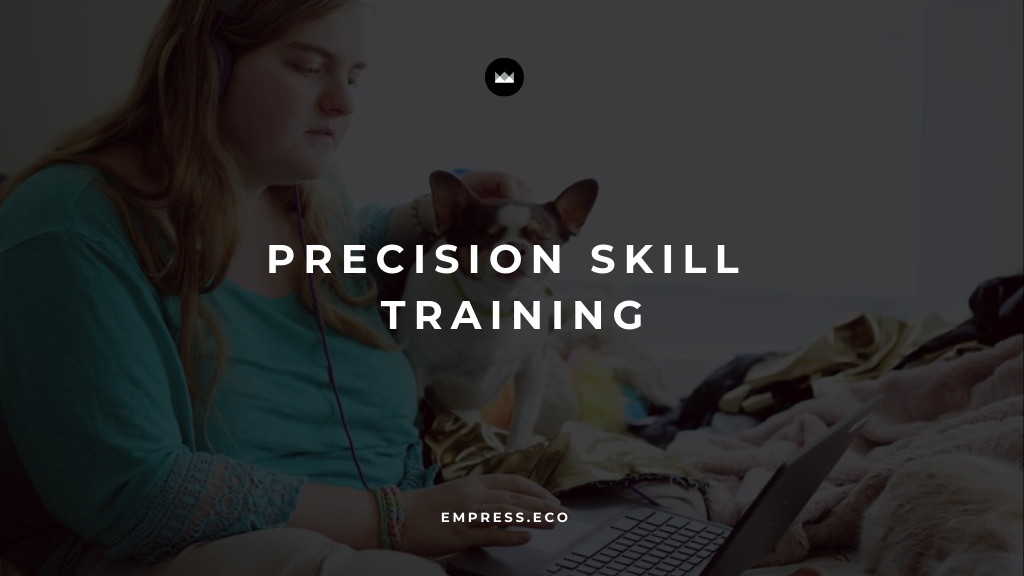
Boost Team Performance with Focused Skill Enhancement Strategies
Discover how targeted training can elevate your team's productivity and efficiency
Table of Contents
Having a skilled workforce is no longer just an advantage—it’s a necessity. But more than just having a skilled team, the real edge lies in having a workforce equipped with the precise skills needed to tackle your business’s unique challenges. This is where Precision Skill Enhancement comes into play.
Imagine this: instead of broad training programs that try to cover every possible skill, what if you could zero in on the exact skills your team needs to improve? That’s the essence of Precision Skill Enhancement—a targeted approach to training that hones in on specific skill gaps, transforming your team’s capabilities and driving better performance across the board.
Understanding Precision Skill Enhancement
Precision Skill Enhancement is all about customization. Unlike traditional training programs that might take a broad approach, this method focuses on the specific needs of your team. It’s a strategic approach that involves identifying the exact skills that need development and then creating a training program tailored to those needs.
For example, let’s say your customer support team is excellent at resolving issues over the phone but struggles with email communication. Instead of enrolling the entire team in a generic communication course, Precision Skill Enhancement would focus specifically on improving written communication skills, teaching techniques for clear, concise, and empathetic responses via email. This targeted approach ensures that the training is relevant, effective, and immediately applicable.
Key Benefits of Precision Skill Enhancement
Precision Skill Enhancement offers several significant advantages over traditional training methods. Let’s explore some of these benefits in detail:
1. Targeted Skill Development
One of the most compelling advantages of Precision Skill Enhancement is its focus on targeted skill development. By honing in on specific skill gaps, this approach ensures that every training session is directly relevant to your team’s needs. This not only makes the training more effective but also more efficient, as time isn’t wasted on irrelevant content.
For instance, if your sales team is strong in lead generation but weak in closing deals, a Precision Skill Enhancement approach would focus specifically on closing techniques, negotiation tactics, and strategies for overcoming objections. By targeting these specific areas, your team can improve where it matters most, leading to better overall performance.
2. Increased Productivity
When employees are equipped with the precise skills they need to excel in their roles, their productivity naturally increases. Tailored training programs ensure that team members are learning exactly what they need to perform their jobs more effectively, leading to greater efficiency and better use of resources.
For example, if a production team is struggling with efficiency due to a lack of specific technical skills, targeted training can address these gaps, teaching the exact processes and techniques needed to streamline production. The result? A more competent team that can produce more with less effort and fewer errors.
3. Enhanced Employee Engagement
Employees are more likely to engage with training programs that are directly relevant to their roles and career aspirations. Precision Skill Enhancement fosters a culture of continuous learning and development, which can significantly boost morale and job satisfaction. When employees see that their organization is investing in their personal and professional growth, they feel valued and motivated.
For instance, an IT department might benefit from targeted training in the latest cybersecurity practices. Not only does this improve their skill set, but it also keeps them engaged and excited about their work, knowing that they’re gaining knowledge that’s directly applicable to their day-to-day responsibilities.
4. Improved Performance Metrics
Precision Skill Enhancement isn’t just about making employees better at their jobs—it’s about driving measurable improvements in performance. By focusing on specific skill deficiencies, organizations can see tangible improvements in key performance indicators (KPIs) such as productivity, accuracy, and customer satisfaction.
For example, if customer service representatives receive targeted training in conflict resolution, you might see a significant drop in call escalations and an increase in customer satisfaction scores. These kinds of improvements can have a direct impact on your bottom line, making Precision Skill Enhancement not just a training strategy but a business strategy.
Implementing Precision Skill Enhancement
Implementing Precision Skill Enhancement requires a thoughtful and strategic approach. Here’s how you can get started:
1. Conduct a Skills Assessment
The first step in implementing Precision Skill Enhancement is to conduct a comprehensive skills assessment. This involves evaluating the current skill levels of your team members and identifying specific gaps that need to be addressed. This assessment provides a clear baseline from which you can develop targeted training programs.
For example, you might use surveys, interviews, or skills assessment tools to gather data on your team’s current abilities. This information will help you identify the areas that need the most attention and prioritize them accordingly.
2. Develop Customized Training Plans
Once you’ve identified the skill gaps, the next step is to develop customized training plans. These plans should be tailored to the specific needs of each team member and focus on addressing the identified gaps. Consider using a mix of training methods—such as workshops, e-learning, and on-the-job training—to cater to different learning styles and preferences.
For instance, a marketing team might need targeted training in digital marketing strategies. The training plan could include online courses on SEO, workshops on social media marketing, and hands-on projects that allow team members to apply what they’ve learned in real-world scenarios.
3. Set Clear Goals and Metrics
To ensure that your Precision Skill Enhancement efforts are effective, it’s important to set clear goals and metrics. What specific outcomes are you hoping to achieve? How will you measure success? By establishing specific objectives and defining metrics to track progress, you can regularly evaluate the effectiveness of the training and make adjustments as needed.
For example, if your goal is to improve the accuracy of your data entry team, you might set a target to reduce errors by 20% within three months. You could then track the error rate before and after the training to see if the goal has been met.
4. Foster a Learning Culture
Precision Skill Enhancement is not a one-time event—it’s an ongoing process. To truly maximize the benefits of this approach, it’s essential to foster a culture of continuous learning and development within your organization. Encourage team members to apply new skills in their daily work, provide opportunities for ongoing learning, and offer regular feedback and support.
For example, you could implement a mentorship program where more experienced team members guide others in applying their new skills. Additionally, you might offer incentives for continuous learning, such as certifications or bonuses for completing advanced training programs.
Challenges and Considerations
While Precision Skill Enhancement offers numerous benefits, it’s important to be aware of potential challenges and considerations:
1. Resource Allocation
Developing and implementing customized training programs requires a significant investment of time, budget, and resources. Organizations must ensure that they allocate sufficient resources to support these initiatives. This includes not only the financial investment but also the time required for team members to participate in training without disrupting their regular duties.
For example, a small business with limited resources might need to prioritize the most critical skill gaps first and gradually expand the training program as resources allow. Alternatively, the business might explore cost-effective training options, such as online courses or in-house workshops.
2. Change Management
Introducing a new training approach can sometimes meet resistance, especially if employees are used to more traditional methods. Effective change management is crucial to ensure buy-in from all stakeholders. This might involve clear communication about the benefits of Precision Skill Enhancement, as well as involving employees in the planning process to make them feel more invested in the initiative.
For instance, you could hold a company-wide meeting to explain the new training approach, address any concerns, and gather feedback from employees. By involving employees in the process and addressing their concerns early on, you can reduce resistance and increase support for the initiative.
3. Continuous Improvement
Finally, it’s important to recognize that Precision Skill Enhancement is an ongoing process. Regular evaluation and adaptation are necessary to ensure that the training continues to meet the evolving needs of your business and your team. This might involve regularly reviewing training outcomes, gathering feedback from participants, and making adjustments to the training content or delivery methods as needed.
For example, you might conduct quarterly reviews of the training program, analyzing performance data and participant feedback to identify areas for improvement. By continuously refining the program, you can ensure that it remains effective and relevant over time.
Tools and Platforms for Precision Skill Enhancement
To successfully implement Precision Skill Enhancement, it’s important to leverage the right tools and platforms. Here are a few options that can help you deliver targeted training programs effectively:
- Learning Management Systems (LMS): An LMS allows you to deliver, track, and manage training programs online. These platforms offer a range of features, including course authoring, assessments, and reporting, making it easier to implement and monitor your Precision Skill Enhancement efforts.
- Skill Assessment Tools: These tools help you assess the current skill levels of your team members, identify gaps, and track progress over time. They provide valuable data that can inform your training strategy and ensure that it’s aligned with your business goals.
- E-Learning Platforms: E-learning platforms offer a flexible and cost-effective way to deliver training. They provide access to a wide range of courses and resources that can be tailored to meet the specific needs of your team.
By using these tools, you can streamline the implementation of Precision Skill Enhancement and ensure that your training efforts are both effective and scalable.
Conclusion
Precision Skill Enhancement is more than just a training strategy—it’s a powerful tool for driving business success. By focusing on targeted skill development, organizations can enhance productivity, improve employee engagement, and achieve measurable improvements in performance.
As we’ve explored in this blog, the key to success lies in understanding the specific needs of your team, developing customized training plans, and fostering a culture of continuous learning. With the right approach, Precision Skill Enhancement can transform your organization, helping you stay ahead of the competition and achieve long-term success.
At Sage, we’re committed to helping businesses like yours unlock the full potential of their teams through Precision Skill Enhancement. Whether you’re looking to address specific skill gaps, improve productivity, or foster a more engaged workforce, we’re here to guide you every step of the way.
So, are you ready to elevate your team’s performance with targeted training? Let’s work together to create a customized training program that drives results and supports your organization’s growth.
Empress Newsletter
Join the newsletter to receive the latest updates in your inbox.







